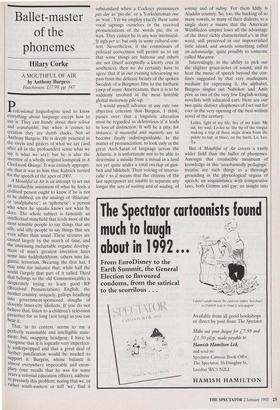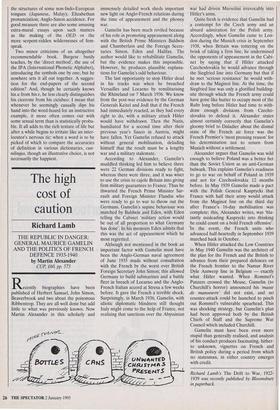Ballet-master of the phonemes
Hilary Corke
A MOUTHFUL OF AIR by Anthony Burgess Hutchinson, £17.99, pp. 347 Professional linguologists tend to know everything about language except how to use it. They can bandy about their schwa and svarabakhd, but when it comes to creation they are dumb clucks. Not so Anthony Burgess. He is deeply practical in the rivets and girders of what we say (and after all in the profoundest sense what we say is what we are): but he is also the inventor of a wholly original loutspeak in A Clockwork Orange. It was entirely appropri- ate that it was to him that Kubrick turned for the speech of the apes of 2001.
A Mouthful of Air is an attempt to set out an irreducible minimum of what he feels a civilised person ought to know if he is not to be dubbed, on the analogy of 'illiterate' or 'analphabetic', as 'aphonetic': a person who when he speaks knows not what he does. The whole subject is famously an Intellectual minefield that leads most of the most sensible people to say things that are Silly, and silly people to say things that are even sillier than usual. These seizures are caused largely by the march of time, and the unceasing ineluctable organic develop- ment of man's greatest invention lures some into fuddyduddyism, others into lin- guistic terrorism. Wearing the first hat, I may note for instance that, while half the world (largely that part of it called Third that belongs to the old Commonwealth) is desperately trying to learn good RP (Received Pronunciation) English, the mother country, uniquely, gallops headlong into government-sponsored sloughs of Slovenly inner-city idiolects. If you do not believe that, listen to a children's television presenter for as long (not long) as you can bear it.
That, in its context, seems to me a Perfectly reasonable and intelligible state- ment: but, swapping headgear, I have to recognise that it is logically very imperfect- ly underpropped and that a great deal of further justification would be needed to support it. Burgess, whose balance is almost everywhere impeccable and exem- PlarY (one recalls that he was for some Years a colonial education officer), address- es precisely this problem; noting that we, or rather south-eastern or toff 'we', find it substandard when a Cockney pronounces pay-day as `pie-die' or a Yorkshireman one as 'wan'. Yet we employ exactly these same vocal signings ourselves in the received pronunciations of the words pie, die or wan. They cannot be in any way intrinsical- ly ugly per se, but only in some cultural con- text. Nevertheless, if the commissars of political correctness still permit us to say that some things are hideous and others are not (itself acceptedly a knotty crux in aesthetics), then we do certainly have to agree that if in our evening televiewing we pass from the delicate beauty of the spoken Swedish of a Bergman film to the barbaric yawp of some Americanum, then it is to be suddenly involved in the most horrible glottal motorway pile-up.
I would myself advance at any rate one objective criterion that Burgess, I think, passes over: that a linguistic alteration must be regarded as deleterious if it leads to loss of distinction. It will be a pity, for instance, if masterful and masterly are to become finally indistinguishable. In the matter of pronunciation, to look only at the great Arch-Satan of language across the Atlantic, it is unfortunate not to be able to determine a missile from a missal in a land not yet quite under a total overlap of gun- belt and biblebelt. Their voicing of intervo- calic t to d means that the citizens of the last superpower are unable to separate any longer the acts of waiting and of wading, of writing and of riding. For them Iddly is Aladdin country. So, too, the backing of so many vowels, in many of their dialects, to a single short a means that the American Wimbledon umpire loses all the advantage of the three richly characterised a's in that word, still preserved in our impoverished little island, and awards something called an advannadge, quite possibly to someone called Macanra.
Interestingly, in the ability to pick out the slighter grace-notes of sound, and to hear the music of speech beyond the con- fines suggested by that very inadequate medium for expressing it, the alphabet, Burgess singles out Nabokov and Amis pere as two of the very few English-writing novelists with educated ears. Here are our two quite distinct allophones of I set out for ever in the very opening of the best-written novel of the century: Lolita, light of my life, fire of my loins. My sin, my soul. Lo-lee-ta: the tip of the tongue making a trip of three steps down from the palate to tap, at three, on the teeth. Lo. Lee. Ta.
But A Mouthful of Air covers a vastly wider field than the ballet of phonemes. Amongst that irreducible minimum of knowledge in this 'unashamedly pedagogic' treatise are such things as a thorough grounding in the physiological organs of speech; an acquaintance with comparative laws, both Grimm and gay; an insight into the structures of some non-Indo-European tongues (Japanese, Malay); Elizabethan pronunciation; Anglo-Saxon accidence. For good measure there are also some amusing extra-mural essays upon such matters as the making of the OED or the more serpent-ridden wildernesses of fern- speak.
Two minor criticisms of an altogether recommendable book. Burgess busily teaches, by the 'direct method', the use of the IPA (International Phonetic Alphabet), introducing the symbols one by one; but he nowhere sets it all out together. A sugges- tion for the end-papers of the second edition? And, though he certainly knows his a from his e, he less clearly distinguishes his cicerone from his cicisbeo: I mean that whenever he seemingly casually dips his hand into the word-hoard for an instructive example, it more often comes out with some sexual term than is statistically proba- ble. It all adds to the rich texture of life but after a while begins to irritate like an inter- locutor's nervous tic: when a word is to be picked of which to compare the accuracies of definition in various dictionaries, cun- nilingus, though an illustrative choice, is not necessarily the happiest.











































 Previous page
Previous page